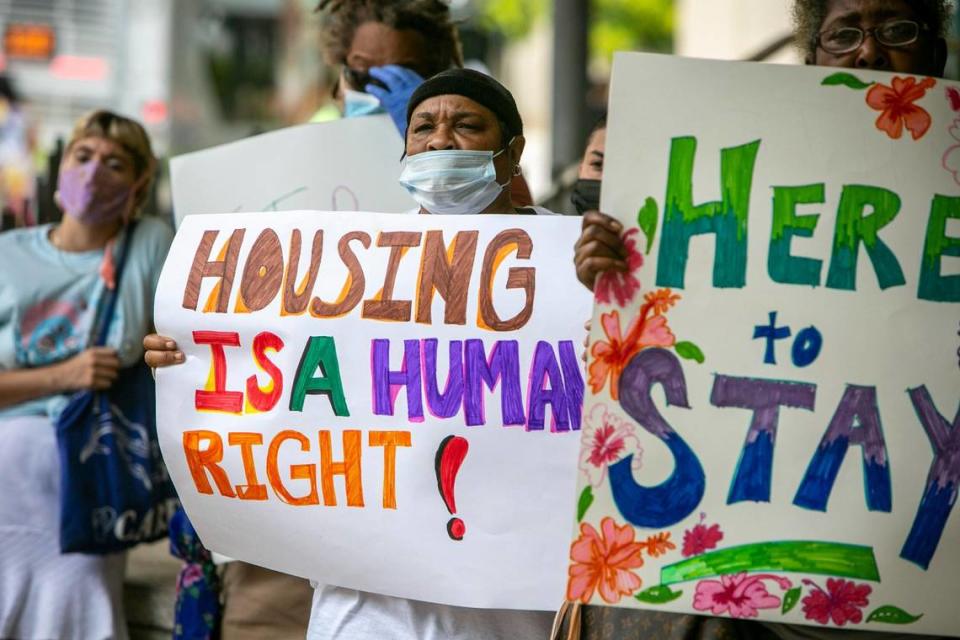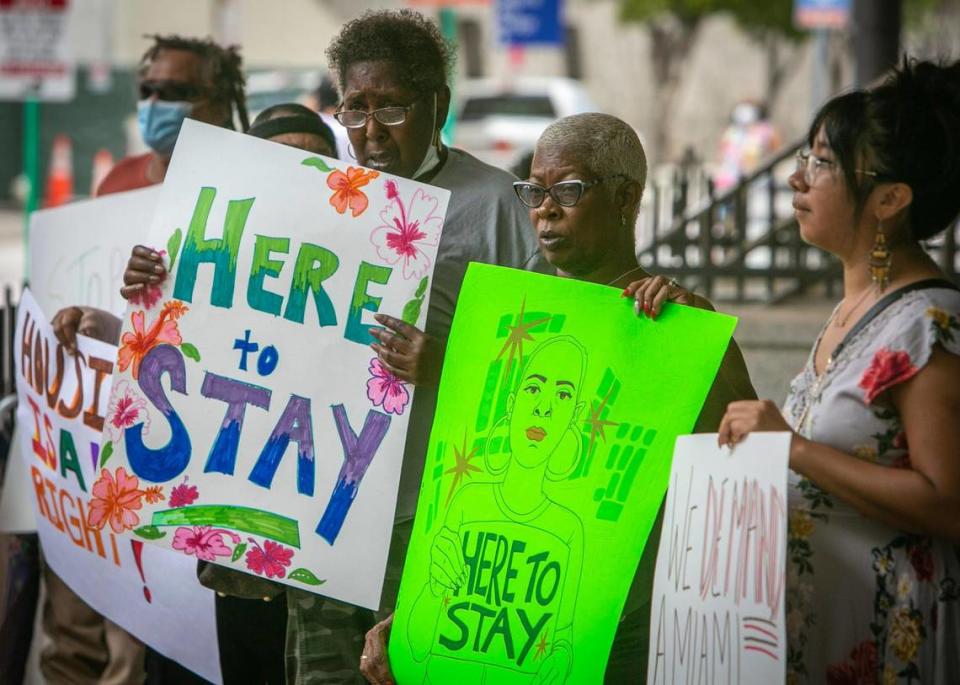‘Avalanche’: Miami renters brace for mass evictions as moratorium ends
As the clock ticks down on the end of the national eviction moratorium, housing advocates are gearing up for evictions throughout Miami-Dade, especially low-income renters without the means to pay the back rent they owe.
The moratorium, which went into effect on Sept. 4 and has been extended several times since but expires on Saturday, was intended to protect renters earning $99,000 or less per year from being evicted due to loss of income or other COVID-related hardships.
But when the CDC program dies, barring a last-minute extension due to the new surge in COVID cases around the U.S., 188,000 “severely distressed” renters in Miami-Dade already paying more than half of their income on rent will be particularly vulnerable to eviction, according to Dr. Ned Murray, associate director of the Florida International University Metropolitan Center.
“Evictions were already high before the pandemic, but with the end of the moratorium we’re facing an avalanche of evictions because so many renters are not just in a position to pay their current rent but also pay their back rent,” he said.
Nationally, more than 11 million renters behind on their payments could be facing a swift eviction, according to the Center on Budget Policy and Priorities.
And although the federal government has earmarked $46 billion in rental relief aid for landlords and tenants impacted by the pandemic, states have been slow to build the proper mechanisms to distribute those funds to people who are eligible for relief.
“If the moratorium ends, you’re going to have a huge surge in evictions with landlords using the courts’ resources like they couldn’t do before,” said Armando Alfonso, a Miami attorney who represents landlords and tenants in eviction cases. “The county courts are going to be overwhelmed. A lot of landlords who have reached out to me say they have been holding off on evicting tenants who are not paying. The minute that thing comes down, it’s going to be a free-for-all.”
Because the CDC moratorium only protects renters who have provided their landlords with an executed declaration form stating loss of income or hardship due to the pandemic, evictions have still proceeded over the past year hitting those who didn’t do that paperwork.
The federal eviction ban is ending. Here’s where to get aid in Miami-Dade and Broward
Evictions in progress
From Sept. 1, 2020, to July 1, 2021, a total of 9,983 evictions have been filed in Miami-Dade, according to the Miami-Dade County Clerk of the Courts. During that same period, a total of 4,409 writs of possession — the final step in the eviction process that gives residents 24 hours to vacate the premises — have also been issued.
But experts say those numbers are poised to skyrocket once the moratorium is over, and the looming threat frightens people who have been protected by the CDC order thus far.
James Watley, 74, pays $768 a month for his one-bedroom apartment at New Arena Apartments in the northern edge of Overtown, where he has lived for four years. Watley, a military veteran, makes do with his monthly Social Security check of $1,200 plus another monthly stipend of $748 from Jackson Memorial Hospital, where he worked as a security supervisor for 10 years.
But a dispute with the building’s management over toilet and bathtub leaks, which generated a water bill of $521 that Watley pays himself, has resulted in seven three-day notices — the first step in the eviction process — being posted on his front door every month since January.
Until now, Watley has been protected from eviction by the moratorium, because New Arena receives low-income-housing tax credits. But when the moratorium ends, those three-day notices could turn into court summonses.
“They keep threatening me even though I’m a tenant there and it’s their responsibility to make the repairs,” he said. “I am very worried, but if the case goes to court, I will just let the judge know what’s going on. If the court says I’m wrong, I will just become homeless again. I was homeless 25 years ago before I got my life in order. Now I have cataracts, diabetes, high blood pressure. They’re trying to do you in knowing that you’re getting to the end of your years.”
Watley added, “But I’m going to fight until the last breath in my body if I know I’m right.”
Housing advocates say courts often side with landlords in eviction cases, placing the burden on tenants to come up with all the back rent they owe into a court registry before their case can be heard.
“The judges are completely unsympathetic,” said Adrian Madriz, executive director at Struggle for Miami’s Affordable and Sustainable Housing (SMASH). “We’re fighting for people to have the right to counsel, because a lot of them are unable to get legal assistance and don’t know what to do. But the courts are on the side of the landlords and are pushing through as many evictions as possible.”

Others argue landlords, especially mom-and-pop landlords who own just a few properties, are unfairly painted as greedy and heartless.
“A lot of these private landlords use their rental properties as part of their retirement or their portfolio,” said Miami attorney David Winker. “They rely on the rental payments to pay their mortgages and insurance and taxes and don’t have the financial reserves to cover those expenses. The judges are sympathetic when abuela is saying in court, ‘I don’t understand why I have to pay all these expenses still and my tenant doesn’t have to pay.’
“The CDC decision was made from a policy perspective that the landlords would take the hit,” Winker said. “The pandemic was hard on everybody, but landlords were particularly hard hit. Yes, there are bad landlords, but there are also good landlords who have no choice, even if they’re sympathetic to the tenant. They have to get the money in or they’re going to lose their property. And in this market, it’s not going to be hard to find another renter to take the current tenant’s place.”
A hot rental market
According to a migration report for the second quarter of 2021 co-authored by Chris Salviati, a housing economist for apartmentlist.com, locals are having to compete with an influx of out-of-towners from areas such as New York, Boston and San Francisco whose budgets are 19% higher than Miami residents, so they can afford to pay higher rents.
“Rents in Miami are up 11.5% year over year, which is higher than the national average of 8.4%,” Salviati said. “The supply and demand fundamentals are driving rents up. We’re seeing a big boom in new household formation as young people who moved back home during the pandemic are starting to move out on their own again.”
The demand for rentals is impacting some people facing eviction desperate to find a new place to live.
Catherine Cambridge, 40, has rented her two-bedroom home in Overtown for eight years. She pays $850 in rent per month but was laid off from her job as a hairdresser during the pandemic last April. She also suffers from debilitating depression after the loss of one of her two sons to gun violence last year.
In December, her landlord told Cambridge she wanted to sell the home and gave her a 45-day notice to move. Since then, the single mother has been looking for another place but hasn’t been able to find one. Her landlord filed to evict her in May. Cambridge qualified for protection under the CDC moratorium but is worried about what will happen when the protection expires.
“I’ve looked at a lot of places, but the landlords don’t trust you because of the CDC moratorium,” she said. “They think you’re going to try to live off the CDC and not pay them...I’m trying to get out of the way but I can’t find anything I can afford.”
Unclaimed aid
Relief for cost-burdened renters is available, although many people don’t know it exists or how to tap into it. Michael Liu, director of the Miami-Dade County Public Housing and Community Development Department, said the county has distributed nearly $28 million of its allotted $60.8 million in its current Emergency Rental Assistance Program (ERAP), which helps people making 80% or less of the county’s median income of $59,100.
Two previous versions of ERAP distributed $13.5 million. The City of Miami ($14 million) and the City of Hialeah ($7 million) have their own rent relief programs, although city administrators did not respond to questions about how much of the funds have been distributed.

An even larger aid, the statewide Our Florida program, has $800 million available in rent relief for qualified applicants and landlords. But the program launched in May and has not yet distributed the bulk of its funds.
Jason Vanslette, a partner at the Kelley Kronenberg law firm who specializes in mortgage foreclosure litigation, said landlords should do more to assist tenants and make them aware of the available resources.
“A lot of people don’t know this assistance even exists,” he said. “They also need to make the application process more accessible and a lot quicker. Some of these programs require an affidavit from your landlord. But many renters and landlords are in a hostile situation, so there can be roadblocks if both need to sign off. Some kind of independent affidavit that there’s a need should be sufficient, especially now that the moratorium is coming to an end.”

